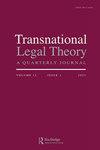(Transnational) law for the Anthropocene: revisiting Jessup’s move from ‘what?’ to ‘how?’
Q2 Social Sciences
引用次数: 2
Abstract
ABSTRACT In the Anthropocene, legal thinking is challenged to re-envision the ‘human' position vis-à-vis the ‘natural' ‘environment'. To map this challenge, this paper draws on three theoretical perspectives: social-ecological resilience thinking, social systems theory and post-humanism. The paper then explores how Jessup's perspective on transnational law could be applied to further develop legal thinking in the Anthropocene. It proposes that legal scholarship and practice would benefit from revisiting Jessup's move from ‘what?' to ‘how?': Rather than thinking about what (transnational) law might, or might not, be, legal researchers and practitioners are now tasked to understand how law can be mobilised as a tool to navigate our relationship with the planet. The paper concludes that Jessup’s practical, progressive and pragmatic approach provides a useful starting point for developing legal forms, strategies and technologies to navigate Anthropocene realities.人类世(跨国)法律:从“什么?”到“如何?”
摘要:在人类世,法律思维面临着重新设想“人”相对于“自然”环境的地位的挑战。为了应对这一挑战,本文借鉴了三个理论视角:社会生态韧性思维、社会制度理论和后人文主义。然后,本文探讨了杰塞普的跨国法观如何在人类世进一步发展法律思维。它提出,法律学术和实践将受益于从“什么?”到“如何?”:法律研究人员和从业者现在的任务是了解如何将法律作为一种工具来引导我们与地球的关系,而不是思考(跨国)法律可能是什么,也可能不是什么。论文的结论是,Jessup的务实、进步和务实的方法为开发法律形式、战略和技术以应对人类世的现实提供了一个有用的起点。
本文章由计算机程序翻译,如有差异,请以英文原文为准。
求助全文
约1分钟内获得全文
求助全文
来源期刊

Transnational Legal Theory
Social Sciences-Law
CiteScore
2.10
自引率
0.00%
发文量
7
期刊介绍:
The objective of Transnational Legal Theory is to publish high-quality theoretical scholarship that addresses transnational dimensions of law and legal dimensions of transnational fields and activity. Central to Transnational Legal Theory''s mandate is publication of work that explores whether and how transnational contexts, forces and ideations affect debates within existing traditions or schools of legal thought. Similarly, the journal aspires to encourage scholars debating general theories about law to consider the relevance of transnational contexts and dimensions for their work. With respect to particular jurisprudence, the journal welcomes not only submissions that involve theoretical explorations of fields commonly constructed as transnational in nature (such as commercial law, maritime law, or cyberlaw) but also explorations of transnational aspects of fields less commonly understood in this way (for example, criminal law, family law, company law, tort law, evidence law, and so on). Submissions of work exploring process-oriented approaches to law as transnational (from transjurisdictional litigation to delocalized arbitration to multi-level governance) are also encouraged. Equally central to Transnational Legal Theory''s mandate is theoretical work that explores fresh (or revived) understandings of international law and comparative law ''beyond the state'' (and the interstate). The journal has a special interest in submissions that explore the interfaces, intersections, and mutual embeddedness of public international law, private international law, and comparative law, notably in terms of whether such inter-relationships are reshaping these sub-disciplines in directions that are, in important respects, transnational in nature.
 求助内容:
求助内容: 应助结果提醒方式:
应助结果提醒方式:


